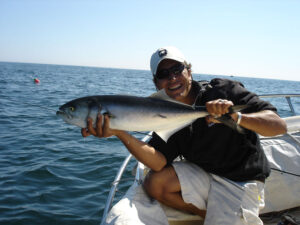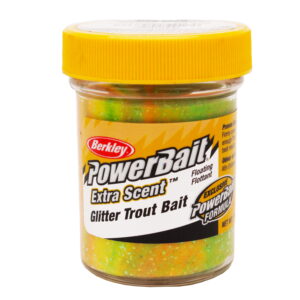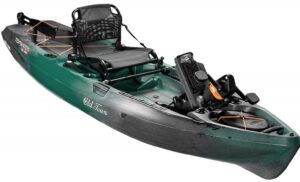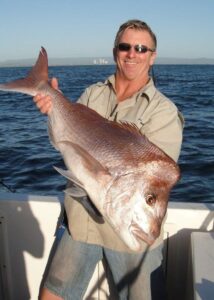Are you a fishing enthusiast who is eager to cast your line into the vast ocean? If so, it’s important to familiarize yourself with the concept of an ocean fishing license. Whether you’re a seasoned angler or a beginner, understanding the regulations and requirements associated with obtaining a fishing license can make your fishing experience both legal and enjoyable.
What is an Ocean Fishing License?
An ocean fishing license, also known as a saltwater fishing license, is a permit that allows individuals to fish in the ocean legally. This license is typically required for recreational fishing activities, whether you’re fishing from a boat, pier, jetty, or shore. It ensures that anglers are aware of and abide by the rules and regulations set forth by the governing authorities.
Why Do You Need an Ocean Fishing License?
The primary reason for needing an ocean fishing license is to promote sustainable fishing practices and protect marine resources. By implementing licensing requirements, authorities can monitor and regulate fishing activities to prevent overfishing, protect endangered species, and maintain the overall health of the ocean ecosystem.
Additionally, an ocean fishing license helps fund conservation efforts and research initiatives. The revenue generated from fishing licenses is often allocated towards fishery management programs, habitat restoration projects, and educational campaigns that aim to raise awareness about responsible fishing practices.
Who Needs an Ocean Fishing License?
While the specific requirements may vary depending on your location, most regions require individuals above a certain age to obtain an ocean fishing license. In the United States, for example, anyone aged 16 or older is typically required to have a valid fishing license when fishing in saltwater. However, it’s important to check with your local fishing authorities to confirm the exact regulations applicable to your area.
How to Obtain an Ocean Fishing License?
The process of obtaining an ocean fishing license is relatively straightforward. Here are the general steps you need to follow:
- Research the requirements: Start by researching the specific regulations and requirements for obtaining an ocean fishing license in your area. This information can usually be found on the website of your local fishing authority or department of fish and wildlife.
- Choose the right license: Depending on your needs and preferences, there may be different types of ocean fishing licenses available. Some licenses may be valid for a specific duration (e.g., annual, monthly, or daily), while others may have restrictions on the type of fishing gear you can use. Select the license that aligns with your fishing plans.
- Complete the application: Once you’ve identified the appropriate license, complete the application form provided by the fishing authority. The form typically requires personal information, such as your name, address, date of birth, and contact details.
- Pay the fee: In most cases, an ocean fishing license comes with a fee. The fee structure may vary depending on factors such as your residency status, the duration of the license, and whether you’re a senior citizen or a member of the military. Pay the required fee using the accepted payment methods, which may include credit cards, checks, or cash.
- Receive your license: After submitting the application and paying the fee, you will receive your ocean fishing license. It’s essential to keep the license with you whenever you go fishing, as you may be required to present it upon request by law enforcement or fishery officers.
Types of Ocean Fishing Licenses
Depending on your jurisdiction, you may come across different types of ocean fishing licenses. Here are a few common types:
1. Annual License
An annual ocean fishing license provides individuals with the flexibility to fish throughout the year without the need to renew their license frequently. This type of license is ideal for avid anglers who enjoy regular fishing trips and want to save time and effort on the license renewal process.
2. Short-Term License
A short-term ocean fishing license, as the name suggests, is valid for a shorter duration compared to an annual license. It is suitable for occasional anglers or tourists who plan to fish for a limited period, such as during a vacation or a weekend getaway.
3. Daily License
If you prefer spontaneous fishing trips or want to test the waters before committing to a longer license, a daily ocean fishing license may be the right choice for you. This type of license allows you to fish for a single day, offering flexibility and affordability for those who do not fish frequently.
4. Senior or Military License
Many jurisdictions offer discounted ocean fishing licenses for senior citizens or active-duty military personnel. These licenses provide an opportunity for these individuals to enjoy their favorite pastime at a reduced cost.
The Cost of an Ocean Fishing License
The cost of an ocean fishing license can vary depending on several factors, including your location, the type of license, and your residency status. While the specific fees may differ, here are some approximate ranges to give you an idea:
- Annual License: $20 – $100
- Short-Term License: $10 – $40
- Daily License: $5 – $20
- Senior or Military License: Discounted rates, often 50% off the regular fee
It’s important to note that these figures are just estimates, and the actual cost may vary significantly. Be sure to check with your local fishing authority for the most accurate and up-to-date pricing information.
Benefits of Having an Ocean Fishing License
Obtaining an ocean fishing license offers several benefits for both anglers and the environment. Here are some key advantages:
1. Legal Compliance
Having a fishing license ensures that you are fishing within the boundaries of the law. By adhering to the regulations and restrictions, you can avoid penalties, fines, or even legal trouble.
2. Conservation of Marine Resources
An ocean fishing license supports conservation efforts and helps protect the ocean ecosystem. The revenue generated from fishing licenses is often invested in initiatives aimed at preserving fish populations, restoring habitats, and conducting research on sustainable fishing practices.
3. Education and Awareness
Through the process of obtaining an ocean fishing license, anglers gain access to valuable educational resources and information. Fishing authorities often provide guidelines, tips, and updates on fishing regulations, helping anglers stay informed and make responsible choices while enjoying their favorite activity.
4. Support for Fishing Communities
The funds generated from fishing licenses contribute to the local economy and support fishing communities. By purchasing a license, you are indirectly contributing to the livelihoods of those involved in the fishing industry, such as bait and tackle shops, charter boat operators, and fisheries management organizations.
Common Ocean Fishing License Regulations
While the specific regulations may differ based on your location, here are some common rules and restrictions associated with an ocean fishing license:
- Bag and Size Limits: Most jurisdictions impose limits on the number and size of fish that can be caught and retained. These restrictions are in place to prevent overfishing and protect vulnerable fish species.
- Seasonal Closures: Certain fish species may be subject to seasonal closures to protect their spawning or breeding periods. It’s essential to be aware of these closures to ensure compliance with the regulations.
- Restricted Areas: Some areas of the ocean may be designated as marine protected areas or no-fishing zones. These areas are designed to safeguard sensitive habitats and allow fish populations to thrive undisturbed. Make sure to familiarize yourself with the restricted areas to avoid unintentional violations.
- Fishing Gear Restrictions: Different types of fishing gear, such as nets, spears, or traps, may be subject to specific regulations. Ensure that you understand the permitted gear types and any associated restrictions before heading out to fish.
It’s crucial to thoroughly review the regulations and stay up to date with any changes or updates. Fishing authorities often provide comprehensive guides or brochures that outline the specific rules and restrictions applicable to your area.
Consequences of Fishing Without a License
Fishing without a valid ocean fishing license can have serious consequences. Here are some potential ramifications of fishing without the required permits:
- Fines: Authorities may impose hefty fines on individuals caught fishing without a license. The amount of the fine can vary depending on the severity of the offense and the local regulations.
- Confiscation of Gear: In some cases, law enforcement officers may confiscate the fishing gear used by individuals fishing without a license. Losing expensive fishing equipment can be a significant financial setback for anglers.
- Legal Action: Repeat offenders or individuals found engaging in illegal fishing practices may face legal action, which can result in more severe penalties, including probation, community service, or even imprisonment.
Therefore, it is always recommended to obtain the necessary licenses and abide by the fishing regulations to avoid these potential consequences.
Frequently Asked Questions (FAQs)
1. Do I need an ocean fishing license if I’m only fishing for catch-and-release?
Yes, in most cases, you still need an ocean fishing license even if you’re practicing catch-and-release fishing. The license requirement is not solely based on whether you intend to keep the fish or release it. It is primarily to ensure that anglers are aware of and abide by the fishing regulations, regardless of their fishing method or intent.
2. Can I use my freshwater fishing license in the ocean?
No, a freshwater fishing license is not valid for fishing in the ocean. Freshwater and saltwater fishing are distinct activities that require separate licenses. While a freshwater fishing license allows you to fish in freshwater bodies such as lakes, rivers, and ponds, an ocean fishing license is specifically for fishing in saltwater bodies such as the ocean, bays, and estuaries.
3. Are there any exemptions or discounts for children or minors?
Yes, many jurisdictions offer exemptions or discounts for children or minors. The specific age at which a fishing license is required may vary from region to region. In some areas, children under a certain age may be exempt from the license requirement, while others may offer discounted rates for young anglers. It’s essential to check with your local fishing authority to determine the regulations and fees applicable to children or minors.
4. Can I fish without a license if I am fishing from a charter boat?
In most cases, if you are fishing from a licensed charter boat, you do not need an individual fishing license. The charter boat operator typically holds a commercial license that covers all passengers on board. However, it’s always a good idea to confirm with the charter boat operator beforehand to ensure that they have the necessary licenses and permits to operate legally.
5. Can I purchase an ocean fishing license online?
Yes, in many regions, you can purchase an ocean fishing license online. Fishing authorities and departments of fish and wildlife often provide online platforms or websites where you can complete the license application and pay the required fees. This convenient option allows you to obtain your fishing license from the comfort of your home and eliminates the need to visit a physical location.
Conclusion
Obtaining an ocean fishing license is essential for any angler who wishes to fish legally and responsibly in the ocean. By adhering to the regulations and obtaining the necessary permits, you not only avoid penalties and legal trouble but also contribute to the conservation and sustainability of marine resources. Remember to research the specific requirements in your area, choose the right type of license, complete the application process, and always carry your license with you when you go fishing. By doing so, you can enjoy your fishing adventures while preserving the beauty and abundance of the ocean for future generations to come.
Frequently Asked Questions (FAQs)
1. Do I need an ocean fishing license if I’m only fishing for catch-and-release?
Yes, in most cases, you still need an ocean fishing license even if you’re practicing catch-and-release fishing. The license requirement is not solely based on whether you intend to keep the fish or release it. It is primarily to ensure that anglers are aware of and abide by the fishing regulations, regardless of their fishing method or intent.
2. Can I use my freshwater fishing license in the ocean?
No, a freshwater fishing license is not valid for fishing in the ocean. Freshwater and saltwater fishing are distinct activities that require separate licenses. While a freshwater fishing license allows you to fish in freshwater bodies such as lakes, rivers, and ponds, an ocean fishing license is specifically for fishing in saltwater bodies such as the ocean, bays, and estuaries.
3. Are there any exemptions or discounts for children or minors?
Yes, many jurisdictions offer exemptions or discounts for children or minors. The specific age at which a fishing license is required may vary from region to region. In some areas, children under a certain age may be exempt from the license requirement, while others may offer discounted rates for young anglers. It’s essential to check with your local fishing authority to determine the regulations and fees applicable to children or minors.
4. Can I fish without a license if I am fishing from a charter boat?
In most cases, if you are fishing from a licensed charter boat, you do not need an individual fishing license. The charter boat operator typically holds a commercial license that covers all passengers on board. However, it’s always a good idea to confirm with the charter boat operator beforehand to ensure that they have the necessary licenses and permits to operate legally.
5. Can I purchase an ocean fishing license online?
Yes, in many regions, you can purchase an ocean fishing license online. Fishing authorities and departments of fish and wildlife often provide online platforms or websites where you can complete the license application and pay the required fees. This convenient option allows you to obtain your fishing license from the comfort of your home and eliminates the need to visit a physical location.
Summary
An ocean fishing license is a necessary permit for individuals who wish to fish legally and responsibly in the ocean. It promotes sustainable fishing practices, supports conservation efforts, and helps protect marine resources. Obtaining an ocean fishing license involves researching the requirements, selecting the appropriate license type, completing the application process, and paying the required fees. Failure to obtain a fishing license can result in fines, gear confiscation, or legal action. It is important to familiarize yourself with the regulations and restrictions associated with an ocean fishing license to ensure a enjoyable and compliant fishing experience.





